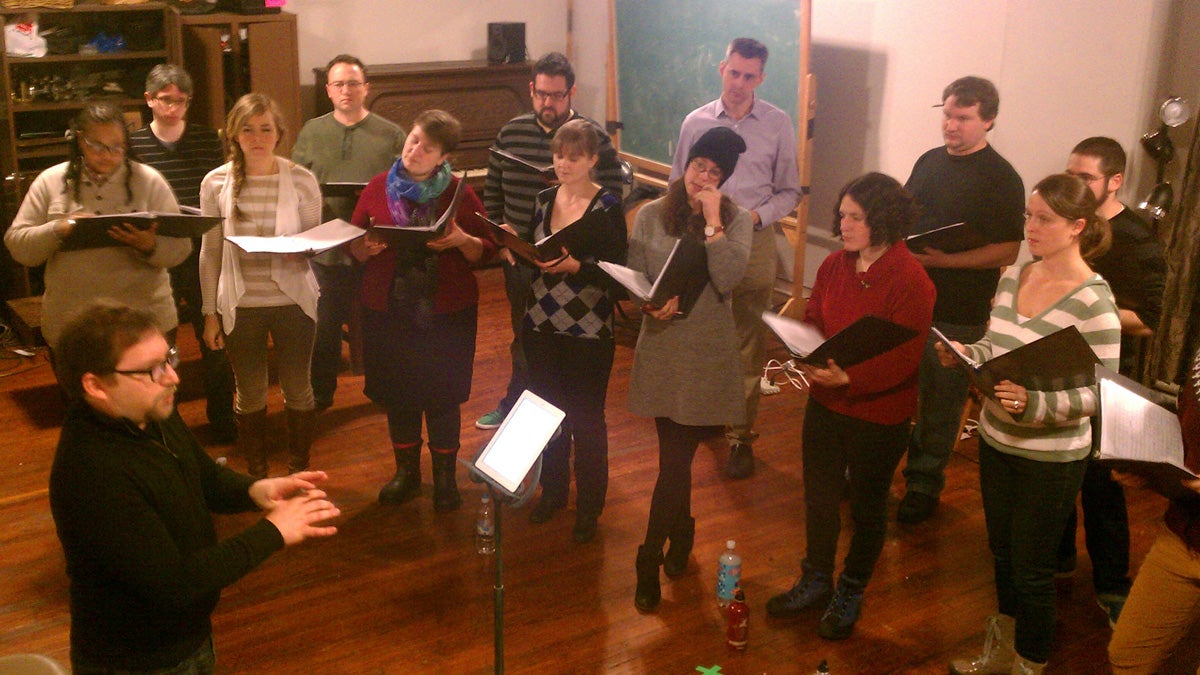Younger singers, audiences find harmony with Philly choral groups
Listen
(Peter Crimmins/WHYY)
Conrad Erb started singing when he was 5 years old in the Mennonite church where he grew up. He continued singing through college. Then he sort of fell out of it.
“I graduated from college 10 years ago, and I really haven’t been doing anything seriously since then,” said Erb, a photographer in Philadelphia.
When Erb got an email from a friend last year about a new chorale group forming in town, to be called PhilHarmonia, he was skeptical.
“I was thinking, ‘Oh, choirs in Philly – it’s probably going to be 80 people.’ I don’t like that setting,” said Erb. “I like something small, where you carry your part better, carry more responsibility. We have 20-22 voices. That’s where I love to be.”
Erb now sings baritone with PhilHarmonia, which will debut this weekend at the Ethical Society building in Rittenhouse Square. Some of the music on the program is very old – with pieces based on 1,000-year-old Gregorian chants; some are contemporary pieces written by living composers.
The ensemble itself is relatively young compared with most classical chorales; the singers’ ages range from 22 to 42. Most are trained amateurs, with a smattering of professionals.
“There is a hunger in young people to sing with a good social group, dedicated to performing at a high level,” said PhilHarmonia’s founder and director Ben Olinsky. “With all of this cultural focus on singing – “Pitch Perfect,” “The Sing-Off,” and “The Voice” – there’s this entire group of people coming out of college right now who want to be in singing groups.”
Olinsky, who is based in Washington, D.C., and works for a political policy think tank, founded the 18th Street Singers, a larger 45-voice choir that regularly performs around the capital. His ensembles are designed to be social groups as much as singing groups.
“People who spend time together socially sing better together, and vice-versa,” he said during a recent rehearsal at St. Mary’s Cathedral in Rittenhouse Square.
Younger singers bring younger audiences. PhilHarmonia’s concerts will be informal, with performers wearing their own clothes – no robes, costumes or formalwear – and introducing the program pieces themselves.
“I always think of a particular color – I think of certain chords as very purple or blue chords,” said Erb, when describing a contemporary composition by Ola Gjeilo written for the text of the Ubi Caritas, an ancient Latin hymn. “For me, it’s like this beautiful purple that I’m singing.”
The performance on Sunday afternoon begins at 2:30, so as to not compete with the Super Bowl. They may be young, but they aren’t crazy.
Bach cantatas catch on
PhilHarmonia is not the first choral group in town to woo younger audiences.
Last fall, Choral Arts Philadelphia launched a series of informal, midweek performances of Bach cantatas, choral works accompanied by instruments, at St. Mark’s Episcopal Church on Locust Street.
The monthly concerts, called Bach@7, start at 7 p.m. and last just one hour, making them convenient for the after-work crowd. They are pay-what-you-wish, which draws a diverse crowd, and often capped by a wine tasting.
“We’re now actually having a relationship with our audiences. It’s not a faceless mass we see out there, but we’re recognizing faces and names,” said Matthew Glandorf, artistic director of Choral Arts Philadelphia. “That is a hugely gratifying experience for what we’re trying to do here — we’re trying to create community around here, rather than, ‘OK, here’s our event, now go home and maybe we’ll see you again in the spring, or maybe not.'”
This is a new approach to concerts for the 32-year-old organization, and Glandorf had no idea what to expect when the first Bach@7 concert took place in October. He was surprised to find St. Mark’s nearly full. These early-music concerts can draw more than 200 people. The next one is Feb. 19.
WHYY is your source for fact-based, in-depth journalism and information. As a nonprofit organization, we rely on financial support from readers like you. Please give today.





